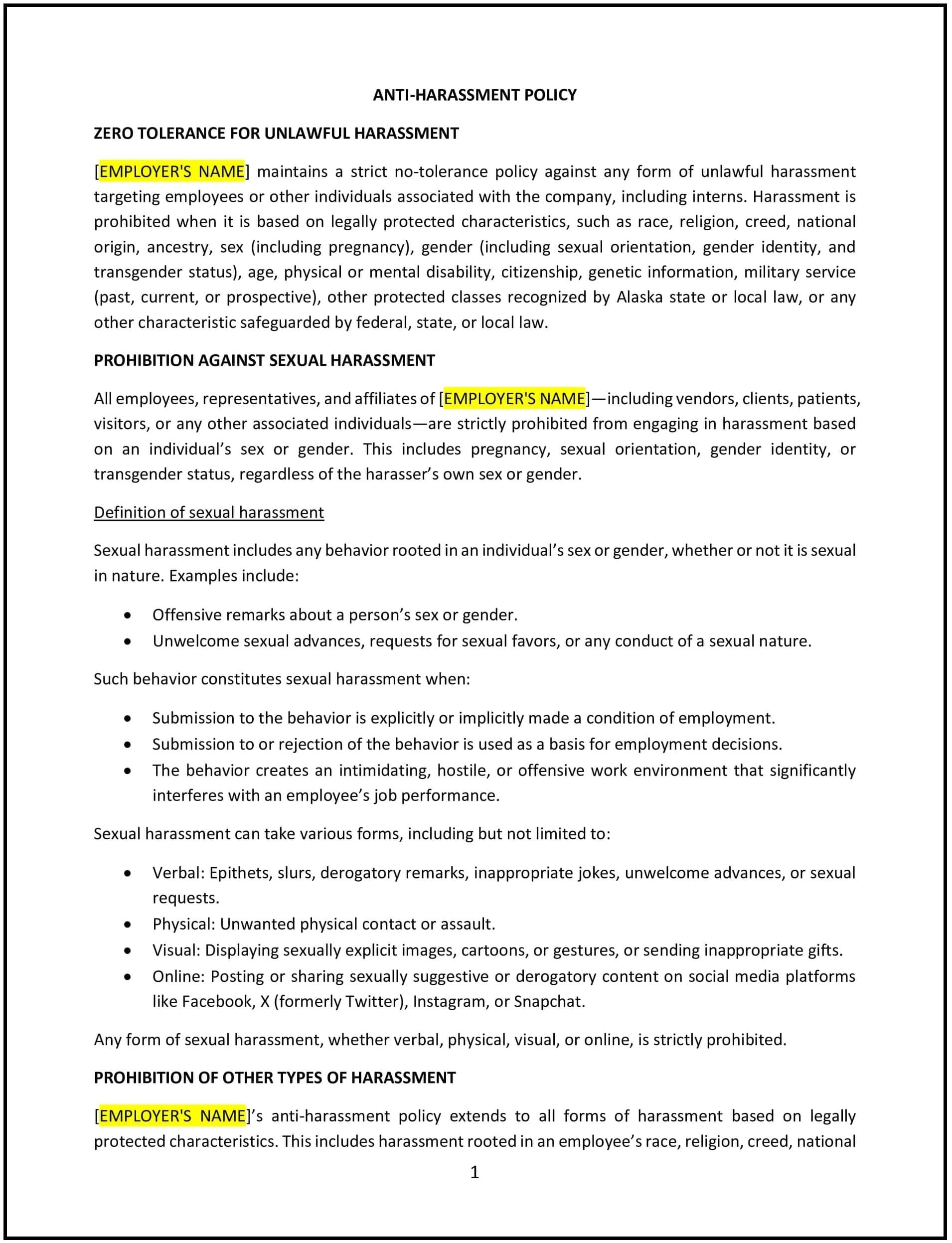Got contracts to review? While you're here for policies, let Cobrief make contract review effortless—start your free review now.

Customize this template for free
Anti-harassment policy (Alaska)
In Alaska, an anti-harassment policy is essential for maintaining a safe and respectful workplace where all employees can work free from harassment, bullying, or discrimination. This policy outlines the company's commitment to preventing harassment in all forms, including sexual harassment, racial harassment, and other forms of offensive behavior. By implementing this policy, businesses in Alaska can ensure they create a welcoming environment that supports the well-being and dignity of all employees.
Harassment, whether verbal, physical, or visual, can undermine employee morale, cause emotional distress, and even result in legal consequences. This policy aims to prevent harassment by promoting awareness, providing clear reporting procedures, and outlining the steps the company will take to address harassment complaints.
How to use this anti-harassment policy (Alaska)
- Define harassment clearly: Outline the specific behaviors that are considered harassment, including verbal abuse, inappropriate jokes, offensive gestures, and bullying. Ensure that employees understand what constitutes harassment, including the fact that harassment can be based on race, gender, religion, sexual orientation, or other protected categories under state and federal law.
- Set expectations for behavior: Clearly communicate the company's stance on harassment, emphasizing zero tolerance for any form of harassment. All employees should know that they are expected to treat each other with respect and dignity in the workplace.
- Establish a reporting system: Set up a clear and confidential procedure for reporting harassment. Employees should know how to report incidents safely without fear of retaliation. Ensure that management is trained to handle complaints effectively and sensitively.
- Take corrective actions: Outline the steps the company will take to address harassment complaints. This may include investigating the complaint, taking disciplinary action against offenders, and implementing changes to prevent future incidents.
- Promote training and education: Provide ongoing training for employees and managers to raise awareness of harassment and ensure they understand the policy and reporting procedures. Training can include scenarios, discussions, and role-playing exercises to illustrate what constitutes harassment and how to prevent it.
Benefits of using an anti-harassment policy (Alaska)
A robust anti-harassment policy offers numerous benefits to businesses in Alaska. Here's how it helps:
- Protects employees: By establishing clear guidelines and reporting mechanisms, the policy ensures that employees have a safe environment where they can work without fear of harassment.
- Reduces legal risks: An effective anti-harassment policy can help businesses comply with state and federal employment laws, such as Title VII of the Civil Rights Act, and protect the company from legal liabilities related to harassment claims.
- Fosters a positive workplace culture: The policy helps build a culture of respect and inclusion, where employees feel valued and empowered to perform at their best.
- Enhances employee retention: When employees feel safe and respected, they are more likely to remain with the company, reducing turnover and recruitment costs.
- Promotes productivity: A harassment-free environment fosters better communication, collaboration, and overall productivity, as employees can focus on their work without distractions or fear of harassment.
Tips for using an anti-harassment policy (Alaska)
- Be clear and comprehensive: The policy should cover all forms of harassment, including sexual harassment, racial harassment, and bullying. Ensure that the language is clear, accessible, and easy to understand for all employees.
- Ensure confidentiality: Confidentiality is crucial when handling harassment complaints. Make it clear that the company will protect the privacy of individuals involved in the complaint process to the extent possible.
- Create a supportive environment: Encourage a culture where employees feel comfortable coming forward with complaints. This can be achieved by creating a supportive environment in which employees feel that their concerns will be taken seriously and addressed promptly.
- Act quickly: Address harassment complaints promptly to prevent further incidents. Taking immediate action demonstrates the company’s commitment to a safe and respectful workplace.
- Review and update the policy regularly: Ensure that the policy stays up to date with any changes in laws or company practices. Review the policy regularly to ensure it remains relevant and effective.